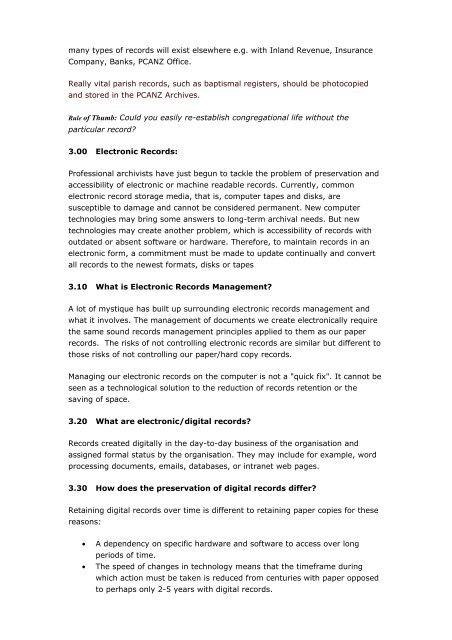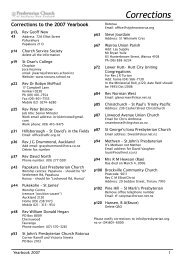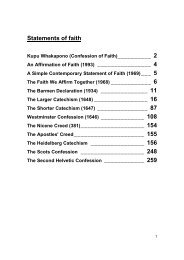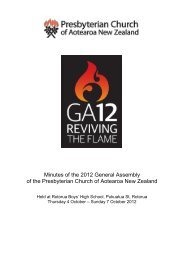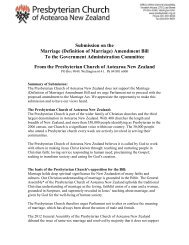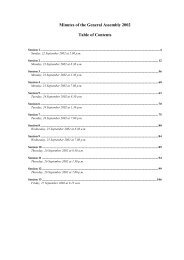Records and Archives Management for Presbyteries - Presbyterian ...
Records and Archives Management for Presbyteries - Presbyterian ...
Records and Archives Management for Presbyteries - Presbyterian ...
Create successful ePaper yourself
Turn your PDF publications into a flip-book with our unique Google optimized e-Paper software.
many types of records will exist elsewhere e.g. with Inl<strong>and</strong> Revenue, Insurance<br />
Company, Banks, PCANZ Office.<br />
Really vital parish records, such as baptismal registers, should be photocopied<br />
<strong>and</strong> stored in the PCANZ <strong>Archives</strong>.<br />
Rule of Thumb: Could you easily re-establish congregational life without the<br />
particular record?<br />
3.00 Electronic <strong>Records</strong>:<br />
Professional archivists have just begun to tackle the problem of preservation <strong>and</strong><br />
accessibility of electronic or machine readable records. Currently, common<br />
electronic record storage media, that is, computer tapes <strong>and</strong> disks, are<br />
susceptible to damage <strong>and</strong> cannot be considered permanent. New computer<br />
technologies may bring some answers to long-term archival needs. But new<br />
technologies may create another problem, which is accessibility of records with<br />
outdated or absent software or hardware. There<strong>for</strong>e, to maintain records in an<br />
electronic <strong>for</strong>m, a commitment must be made to update continually <strong>and</strong> convert<br />
all records to the newest <strong>for</strong>mats, disks or tapes<br />
3.10 What is Electronic <strong>Records</strong> <strong>Management</strong>?<br />
A lot of mystique has built up surrounding electronic records management <strong>and</strong><br />
what it involves. The management of documents we create electronically require<br />
the same sound records management principles applied to them as our paper<br />
records. The risks of not controlling electronic records are similar but different to<br />
those risks of not controlling our paper/hard copy records.<br />
Managing our electronic records on the computer is not a "quick fix". It cannot be<br />
seen as a technological solution to the reduction of records retention or the<br />
saving of space.<br />
3.20 What are electronic/digital records?<br />
<strong>Records</strong> created digitally in the day-to-day business of the organisation <strong>and</strong><br />
assigned <strong>for</strong>mal status by the organisation. They may include <strong>for</strong> example, word<br />
processing documents, emails, databases, or intranet web pages.<br />
3.30 How does the preservation of digital records differ?<br />
Retaining digital records over time is different to retaining paper copies <strong>for</strong> these<br />
reasons:<br />
• A dependency on specific hardware <strong>and</strong> software to access over long<br />
periods of time.<br />
• The speed of changes in technology means that the timeframe during<br />
which action must be taken is reduced from centuries with paper opposed<br />
to perhaps only 2-5 years with digital records.


